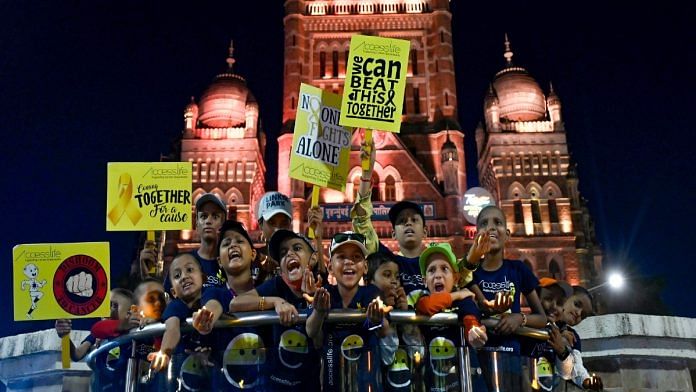New Delhi: The Drug Controller General of India (DCGI) has issued market authorisation to CAR-T (Chimeric Antigen Receptor-T) cell therapy — a breakthrough treatment for some types of cancers developed by IIT-Bombay spin-off company ImmunoACT — paving the way for its commercial launch in the country, ThePrint has learnt.
The therapy, called NexCAR19, has been approved for relapsed-refractory B-cell lymphoma and leukemia.
The development will offer hope to thousands of blood cancer and lymphoma (cancers of the lymph system) patients in the country who cannot afford to travel abroad to avail the cutting-edge therapy, an advanced form of immunotherapy first launched in the US in 2017.
Till now, the therapy was not available in India outside clinical trials and patients willing to avail it mostly went to the US where it cost around $400,000 or over Rs 3.3 crore, according to media reports.
“We have received the market authorisation for our CAR-T cell therapy — NexCAR19 — from the DCGI yesterday and today onwards, patients who are eligible for the treatment can register with the hospitals offering the treatment for it,” Rahul Purwar, CEO of ImmunoACT, told ThePrint Friday.
Officials in the Central Drugs Standards and Control Organisation (CDSCO), the central drug authority, also confirmed that the product has been given market authorisation after a detailed scrutiny of data from phase 1 and 2 clinical trials.
DCGI Rajeev Singh Raghuvanshi, who heads the CDSCO, was not available for comment despite attempts to reach him over the phone. This report will be updated if and when he responds.
As part of the phase 1 and 2 trial of the therapy in India, 60 patients — young adults and adults — underwent treatment across various hospitals, including Tata Memorial Hospitals’ Advanced Centre for Treatment, Research and Education in Cancer in Mumbai.
“The trial results have been very promising and show that the therapy is effective and safe,” Purwar said.
The ImmunoACT CEO also said that to begin with, the therapy would be available in around 20 government and private hospitals treating cancer across most of the major cities. “The cost of the therapy will be around Rs 30-35 lakh per patient,” he added.
In its initial trials, the ImmunoACT project received support from the Centre’s department of biotechnology and Biotechnology Industry Research Assistance Council.
Later, Hyderabad-based drugmaker Laurus Labs also joined the company as a partner and supported the later part of the clinical trials.
“The clinical data indicates ~70 percent overall response rate. The safety profile…indicates a significant improvement over the other commercially approved CD19-directed CAR-T cell therapies,” ImmunoACT said in a statement.
Also read: US lawsuit settlement puts spotlight back on ranitidine. India still undecided on ‘cancer-risk’ drug
What is CAR-T cell therapy?
According to oncologists and cancer researchers, Chimeric Antigen Receptor (CAR)-T cells are a patient’s own immune cells which are engineered in the laboratory to fight cancer.
The evidence generated so far suggests that it is mostly effective in blood cancer and lymphoma, though studies are being conducted in several countries to assess its role in solid tumours and auto-immune diseases such as lupus and multiple sclerosis as well.
As of now, the therapy is usually offered as a second-line of treatment for late-stage leukemia and lymphoma when patients are either not responding to conventional treatments such as chemotherapy and bone-marrow transplant, or have a case of relapsed cancer.
Research from abroad has shown that the therapy can be effective in 40-50 percent of the patients, with slightly better results in pediatric populations.
Around 60,000 new leukemia and lymphoma patients are diagnosed in India every year, according to data from the cancer registry by the Indian Council of Medical Research.
Puwar said ImmunoACT’s patented CAR-T cell platform provides a unique design algorithm to develop novel CAR-T cells and NexCAR19 showed a favourable balance of efficacy and toxicity.
He added that the therapy can be offered to patients with CD19 marker in B cells (the protein used to diagnose cancers that arise from B cells — white blood cells that produce antibodies such as B cell lymphomas, acute lymphoblastic leukemia, and chronic lymphocytic leukemia).
Globally, CAR-T cell therapy has been offered to about 30,000 patients. In India, another biotech start-up, Immuneel Therapeutics backed by Biocon founder Kiran Mazumdar Shaw and US-based oncologist-author Dr Siddhartha Mukherjee, is also waiting for regulatory approvals from the CDSCO to launch its CAR-T cell therapy commercially, according to the firm’s COO Dr Arun Anand.
The Bengaluru-based company has tested its platform in about 24 patients and submitted the detailed data from phase 1, 2 clinical trials to the regulator earlier this year, he said to ThePrint.
Disclosure: Kiran Mazumdar-Shaw is among the distinguished founder-investors of ThePrint. Please click here for details on investors.
(Edited by Smriti Sinha)
Also read: In a 1st, US heart association defines condition linking heart, kidney disease, diabetes & obesity



